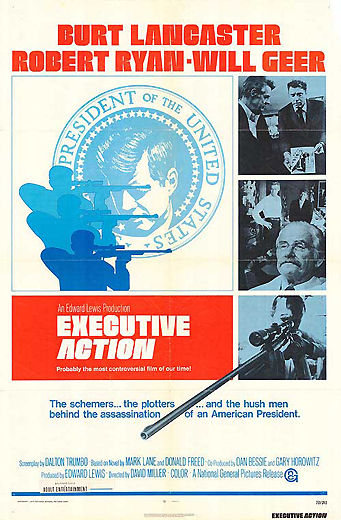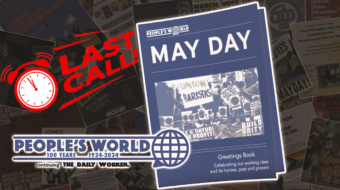
April 15 is the 150th anniversary of Pres. Abraham Lincoln’s death. The cinema is full of assassination and conspiracy-themed plots. Don’t forget, the Great Emancipator was shot by actor John Wilkes Booth on April 14, 1865 at Ford’s Theatre while watching the play Our American Cousin. One hundred years ago D.W. Griffith directed what may be the first major Hollywood motion picture to depict a political assassination scene: 1915’s The Birth of a Nation (the film used as a recruiting tool for the KKK), with future director Raoul Walsh playing Booth.
The Lincoln slaying was part of a political plot by sympathizers of the just defeated Confederacy. But the 1963 shooting of Pres. Kennedy in broad daylight in Dallas is arguably the greatest unsolved murder in American history. Conventional thinkers, hacks and propagandists may seek to perpetuate lone gunman, magic bullet and other cover-ups about assassinations – but the big screen knows better! Behind-the-scenes conspiracies shrouded in mystery and carried out by government elites, rogue agents, mobsters, secret societies and special interests, which are probed by intrepid investigative reporters, crusading district attorneys and patriotic “truthers,” make for far more exciting sagas to entertain audiences.
Political violence is as American as apple pie. To observe the sesquicentennial of Lincoln’s liquidation, here are the Top 10 assassination/conspiracy films of all time, from A to Z. Who knows what evil conspires in the hearts of men? The movies know!!
All the President’s Men
After the mysterious break-in at the Democratic National Committee’s headquarters in the Watergate complex in Washington, the Washington Post’s Bob Woodward (Robert Redford, who also produced) and Carl Bernstein (Dustin Hoffman) fearlessly follow the money. The trail leads to a cabal at 1600 Pennsylvania Avenue, including the White House “Plumbers Unit” with James McCord (Richard Herd) and the team led by Donald Segretti (Robert Walden), who systematically undermine America’s electoral system. Guided by the enigmatic “Deep Throat” (Hal Holbrook), Woodward and Bernstein’s dogged determination and shoe leather crack the case, leading to the 1974 resignation of Pres. Richard Nixon in Alan Pakula’s tautly paced 1976 classic of intrigue in the highest corridors of power.
Executive Action
Ten years after Pres. Kennedy’s killing the trailer for Executive Action proclaimed the movie to be “possibly the most controversial motion picture of our time.” Indeed, Burt Lancaster and Robert Ryan lead a group of conspirators in this covert action feature that boldly contradicts the Warren Commission’s finding that Lee Harvey Oswald acted alone. The 1973 movie raises the spine-tingling specter of two “Oswalds,” anti-Castro Cubans and ex-CIA agents as part of a shadowy conspiracy to whack the liberal-leaning chief executive.
Executive Action is also noteworthy for its left-leaning pedigree: It was co-written by former Communist Party member Dalton Trumbo (portrayed by Bryan Cranston in an upcoming feature), who’d been one of the blacklisted Hollywood Ten, and co-produced by Dan Bessie, whose father, Spanish Civil War veteran Alvah Bessie, had also been a member of the Ten. The co-writers included attorney Mark Lane, an original independent investigator of the Kennedy assassination, and progressive playwright Donald Freed. It was produced by Edward Lewis, who was also a producer for 1960’s Spartacus and Costa-Gavras films, including 1982’s Missing. Blacklisted actor Will Geer (1954’s Salt of the Earth) co-starred as one of Executive‘s rightwing co-conspirators. According to Freed, seed money was provided by antiwar activists for the low budget movie shot for $175,000, which – despite the fact that TV networks refused to advertise it – eventually earned millions.
JFK
Oliver Stone is also on the trail of Kennedy’s assassins in this 1991 masterpiece, which received eight Oscar nominations, including for Best Picture and Director, winning in the cinematography and editing categories, as well as scoring the Best Director Golden Globe. JFK is probably the finest Hollywood assassination/conspiracy movie ever made. At the peak of his powers Stone skillfully demolishes the Warren Commission Report piece by piece, constructing an alternative history wherein Jim Garrison (Kevin Costner plays the New Orleans DA, who in a bit of canny casting portrays Earl Warren!) leads an all-star cast on an epic quest to find out who killed Camelot’s king. And, most importantly, as Donald Sutherland’s inside man Col. Fletcher Prouty ponders in this exhaustively well-researched film, why? Stone was subjected to an unprecedented character assassination campaign for his audacious artistry, although JFK triggered passage of 1992’s Assassination Materials Disclosure Act.
Julius Caesar
Shakespeare’s tragedy dramatizes the iconic assassination conspiracy that toppled Rome’s would-be despot in Joseph L. Mankiewicz’s 1953 black and white epic released at the height of the HUAC/McCarthy era. James Mason as Brutus and John Gielgud as Cassius lead the mutinous band of disillusioned conspirators, who plot to rescue the Roman republic on that fateful Ides of March, when they cut Caesar (Louis Calhern) down at the Senate. During his funeral oration Marlon Brando’s Mark Antony craftily reads Caesar’s will on a scroll only he can see, purportedly bequeathing his wealth to Rome’s masses, as Antony seeks to win the allegiance of the plebeians against the coup plotters. The scene recalls Sen. Joe McCarthy’s reference to a legendary list of Communists inside the U.S. government that only he could “read” (or fabulate).
The Manchurian Candidate
John Frankenheimer’s motion picture prophecy – a lurid, star-studded 1962 Cold War thriller about brainwashing, communism, conspiracy and presidential politics – was withdrawn from distribution after Kennedy was rubbed out. Frank Sinatra (a real-life JFK supporter who portrayed a would-be assassin of Pres. Eisenhower in the 1954 movie Suddenly) plays Major Bennett Marco, who has recurring nightmares and served with Staff Sgt. Raymond Shaw (Laurence Harvey) in Korea, where they were both POWs. Angela Lansbury depicts Raymond’s scheming, coldblooded mother Eleanor Shaw Iselin, wife of fanatical rightwing Sen. John Iselin (James Gregory). Khigh Dhiegh plays the Asian communist Dr. Yen Lo, who ominously says: “His brain has not only been washed, as they say, it’s been dry-cleaned.” The Manchurian Candidate was remade in 2004 with Denzel Washington.
The Parallax View
Activist/actor Warren Beatty plays Joseph Frady, a journalist who goes through the looking glass in this action-packed 1974 movie directed by Alan Pakula about the assassination atop Seattle’s Space Needle of U.S. Sen. Charles Carroll, a presidential candidate. Paula Prentiss plays television newscaster Lee Carter, who’s terrified that she, like six other eyewitnesses, will be disappeared. A Warren Commission-like congressional tribunal whitewashes an “investigation” into the senator’s murder. Frady stumbles upon the multinational Parallax Corporation, which pulls strings behind the scenes and trains prospective assassins in the black op arts. At another senatorial rally Frady ends up being “a patsy,” like Lee Harvey Oswald claimed he was shortly before being gunned down by Jack Ruby.
Rush to Judgment
This 1966 documentary was directed by the radical filmmaker Emile de Antonio and written by the unstoppable Mark Lane. A crudely made low-budget nonfiction film, it is as artless as Stone’s JFK is an aesthetic tour de force. Nevertheless, shot only a few years after the JFK hit, Rush to Judgment is often chilling as Lane, a lawyer, presents much of the doc as a brief for the defense – presumably for Lee Harvey Oswald, who was no longer around to defend himself. The crew travels to Dealey Plaza and interviews on-camera numerous eyewitnesses who describe in vivid detail the shooting of Pres. Kennedy in Dallas on Nov. 22, 1963.
Witness after witness describes at least some shots being fired from behind a wooden fence, on the infamous grassy knoll, where they also report seeing “puffs of smoke.” De Antonio cleverly cuts to text from the Warren Commission’s 889-page final report to contradict what the filmmakers clearly believe are the tome’s bogus findings. Another early JFK truther, newsman Penn Jones, asserts: “The only way to believe the Warren report is not to read it.” As in Parallax, many witnesses die mysterious deaths or are threatened. Jones expresses a wish for a computer to calculate the odds of these strange demises from occurring. After viewing this unforgettable film the odds are against any open-minded viewer believing that some lone nut carried out the crime of the century with a bolt action rifle from the Texas School Book Depository Building.
Seven Days in May
Executive Action producer Edward Lewis also produced John Frankenheimer’s hard hitting 1964 movie about a military plot to overthrow the U.S. government. According to Executive Action‘s co-writer Donald Freed: “In 1963 Pres. Kennedy let it be known to friends in the film industry that [a film adaptation of Fletcher Knebel and Charles Bailey II’s 1962 novel] Seven Days in May should be made… Kennedy went to Hyannis Port so Frankenheimer could film extreme rightwing demonstrations at the White House, where the president couldn’t be during filming with actors. In the story Pres. Jordan Lyman [Fredric March] arranges a disarmament summit with the Soviet Union. This is what JFK was moving towards, with his [“Strategy of Peace”] speech in the summer of 1963 at American University in Washington,” a clarion call for a comprehensive nuclear test ban treaty and defusing the Cold War. When the dovish Pres. Lyman makes similar moves in Seven Days in May the hawkish, Curtis LeMay-like Gen. James Mattoon Scott (Burt Lancaster) plots a coup d’état, which the more liberal-minded Col. Jiggs Casey (Kirk Douglas) opposes. Twilight Zone‘s Rod Serling wrote the screenplay.
Z
Costa-Gavras’ fast paced 1969 masterpiece Z was nominated for the Best Picture Oscar and won for Best Foreign Film and Best Editing. With Z the French-Greek director took the tried and true film noir form, filling it with politics. Inspired by a true story, Z is essentially about the death of a peace candidate (Yves Montand) while he’s campaigning to become the leader of Greece. When a prosecutor (Jean-Louis Trintignant) and journalist (Jacques Perrin) investigate the mysterious death, they prove that the politician was actually assassinated by a high-level military conspiracy. Upon being exposed, the Greek colonels stage a coup and impose a military junta in democracy’s ancient homeland. Costa-Gavras’ classic eventually helped lead to the repressive regime’s isolation and demise.
The Zapruder Film
Dallas businessman Abraham Zapruder was a home-movie enthusiast who was filming the fateful presidential motorcade in Dealey Plaza with his Bell & Howell camera on a concrete pedestal on Elm Street on Nov. 22, 1963, when shots rang out. The 26-second, 486 frames of silent 8mm color celluloid is the Ur text for conspiracy movies and the ultimate assassination footage. In it, JFK rides in his limousine and appears to be caught in a crossfire, hit by bullets being fired from different positions. While Oswald is supposed to be behind Kennedy, the president seems to be hit by a final shot fired from in front of him – perhaps from the fabled grassy knoll – as his skull explodes in frame 313. As Kevin Costner playing Garrison repeats in JFK: “Back and to the left” – not from the direction of the Texas School Book Depository Building.
The Zapruder Film arguably makes “conspiracy theorists” of us all, asking: “Who are you going to believe? Your lying eyes – or the Warren Commission and its ‘magic bullet’ flight of fancy?”
Photo: Movie poster for film Executive Action. “This image is being used to illustrate and inform the article on the movie in question and is used for informational or educational purposes only.”












Comments